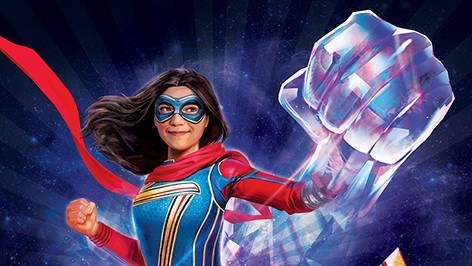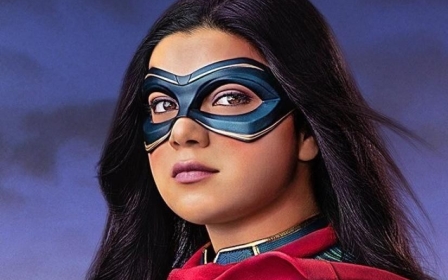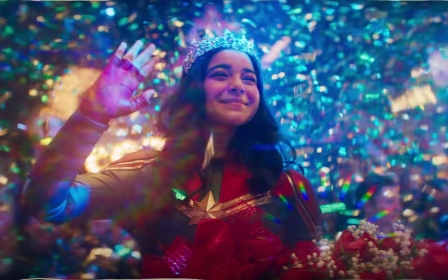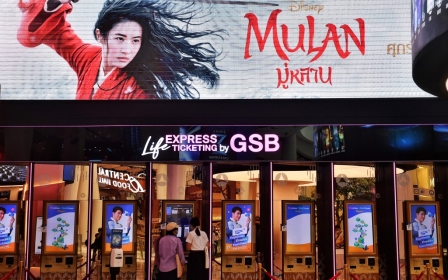How Ms Marvel became the superhero American Muslims needed

Aysha Akhter grew up watching the Marvel Cinematic Universe and was particularly obsessed with Thor, the god of thunder, and Captain America. To this day, her mother still hasn’t taken down the life-sized poster of Chris Evans in her childhood bedroom.
Despite her fandom though, something irked her. All of her favourite superheroes looked nothing like her, a brown-skinned girl from Pennsylvania with large brown eyes.
None of their families resembled Akhter’s family; a mother who wore a dupatta loosely around her head, a father who held her hand and took her to the masjid every Friday, and a grandpa who taught her to say "bismillah" before starting anything.
Until Ms Marvel.
Ms Marvel follows a 16-year-old Pakistani Muslim girl from New Jersey named Kamala Khan as she tries to figure out the new superpowers she gains after putting on an old bangle that belonged to her great grandmother.
New MEE newsletter: Jerusalem Dispatch
Sign up to get the latest insights and analysis on Israel-Palestine, alongside Turkey Unpacked and other MEE newsletters
The six-episode series streaming now on Disney+ touches on a broad cross section of issues affecting American Muslim youth. These range from women not having adequate facilities at mosques to the fallout of the partition of Pakistan and India. The show is everything Akhter grew up wishing she could see.
Empowering representation
“My inner child is ecstatic right now. I have a five-month-old baby girl and Kamala will be the first superhero I will introduce her to, there is no doubt about that,” Akhter told Middle East Eye.
“I don’t think people actually realise how much this [show] means to Muslim Americans.
"We grew up in this country watching white men save the world when that is the furthest thing from reality,” she laughed.
“My daughter is brown and my future children will be brown, and for them to be able to grow up seeing someone that looks like them being celebrated on TV, do you know how empowering that is?”
Ms Marvel is the best-reviewed series in the Disney+ Marvel Comic Universe (MCU), according to Forbes, and is now just one percent shy of being the highest scoring show or movie, falling just behind Black Panther.
The comic series for Khan's Ms Marvel broke records when it first debuted in 2014. It rose to the top of the New York Times bestseller list for graphic novels, and also won a Hugo award for best graphic story in 2015.
The comic was able to achieve widespread popularity and commercial success while also fighting against stereotypical tropes of a Middle Eastern or Muslim characters in American comics and media at-large.
'I craved to be seen like this'
Like Kamala Khan, Aqsa Altaf is a Pakistani (and also part Sri Lankan) Muslim. Based in Los Angeles, she wrote and directed the Disney short film American Eid. For her, Ms Marvel is truly historic.
"I watch every episode as my present self but also as my younger self who craved to be seen like this"
- Aqsa Altaf, director
“Having a story about a Muslim Pakistani superhero by writers and directors that are Muslim and South Asians is truly a big win for our communities in many ways. This is the first time we get to tell our stories on a scale this big,” she told MEE.
“Seeing our culture and religion represented on a massive scale brings such a sense of pride to an audience who for so long were deprived in those spaces by not having true representation or being grossly misrepresented. I watch every episode as my present self but also as my younger self who craved to be seen like this.”
Altaf loves how the story starts off by showing Kamala being a fan of superheroes like Captain Marvel and Black Widow. “And as the show progresses, she is connecting with who she is and where she and her family came from and through that she is discovering her authentic self that will evolve to be Ms Marvel - a superhero who is herself unapologetically.”
For her, seeing that on TV is extraordinary.
“As I grow older, I reach within to find myself through my family and my culture and shed the layers I put on out of fear or pressure to assimilate and belong in America,” she said.
“Every day I embrace who I am and where I come from, and seeing shows like Ms Marvel out there makes the journey more meaningful.”
A relatable superhero
Akram Shibly is an independent filmmaker based in New York. Every week when he watches Ms Marvel, he says he cannot contain himself and finds that he is jumping off the couch. For him, it’s a huge step forward.
“We didn't see ourselves in these sort of action-packed, cinematic experiences in the way that we see ourselves now in Ms Marvel. So, to have a hero that shares our faith, and, frankly, wears it on her sleeve, is really beautiful and refreshing,” he said.
“I grew up in post 9/11 America where the ways we were portrayed in film were so demoralising. From, being called ‘terrorists’ to ‘backwards',” he said.
“This is the first time I've seen something mainstream where our families, our masjid, our communities, feel real. Not exaggerated or stereotypical. It just feels real, you know?”
He explained how being Muslim is not an incidental part of Kamala Khan’s identity. She is very much a Muslim character dealing with the same issues real American Muslims face, going to the mosque, complaining about the women’s side and so on.
To him, it’s all very relatable.
Middle East Eye delivers independent and unrivalled coverage and analysis of the Middle East, North Africa and beyond. To learn more about republishing this content and the associated fees, please fill out this form. More about MEE can be found here.





